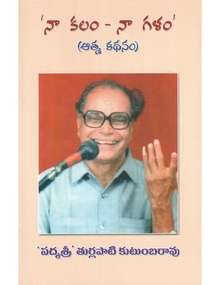Turlapaty Kutumba Rao
| Turlapaty Kutumba Rao | |
|---|---|
 | |
| Born |
1933 Vijayawada, Andhra Pradesh, India |
| Occupation | Journalist, Orator |
| Children | 1; Son: Jawahar Lal |
| Awards |
Padma Shri Pratibha Puraskar Kalaprapoorna title Guardian of Telugu International Man of the Year World Lifetime Achievement Award National Citizen Award President's Gold Medal |
Turlapaty Kutumba Rao is an Indian journalist and orator,[1] known for his service to journalism in Telugu language.[2][3] He is reported to have written over 4000 biographies and delivered over 16000 public speeches which has been recorded by the Telugu Book of Records[4][5] as a world record.[2]
Biography
Kutumba Rao was born in 1933 at Vijayawada in the South Indian state of Andhra Pradesh.[2][3] He is a former secretary to T. Prakasham, former Chief Minister of the state and is known to have mooted the idea of demarcating states on the basis of language in 1947, when India became independent.[3] He is also a former chairman of the Andhra Pradesh Grandhayala Parishad,[6] a policy making body of the Government of Andhra Pradesh.[7] The journey of his life is recorded in his autobiography, Naa Kalam - Naa Galam, released in 2012.[8]
He is a recipient of the Pratibha Puraskar from the Telugu University, Kalaprapoorna title from Andhra University and the title of Guardian of Telugu from C. Rajagopalachari, then Governor of Andhra Pradesh.[3] Rao has also received the President's Gold Medal.[3] He was honored by the Government of India, in 2002, with the fourth highest Indian civilian award of Padma Shri[9] making him the first journalist from the state of Andhra Pradesh to receive the award.[3] He has also been a nominee for Padma Bhushan for the year 2014.[10][11]
References
- ↑ "Turlapaty Kutumba Rao". YouTube video. Chaitanya Kurada. 30 April 2014. Retrieved January 20, 2015.
- 1 2 3 "Telugu Times". Telugu Times. 2014. Retrieved January 21, 2015.
- 1 2 3 4 5 6 "Vivid Bharati". Google Blog. Vivid Bharati. 23 September 2013. Retrieved January 21, 2015.
- ↑ "TBR The Hindu". The Hindu. 1 January 2013. Retrieved January 21, 2015.
- ↑ "TBR". TBR. 2014. Retrieved January 21, 2015.
- ↑ "The Hindu". The Hindu. 25 June 2010. Retrieved January 21, 2015.
- ↑ "AP Public Libraries". AP Public Libraries. 2014. Retrieved January 21, 2015.
- ↑ "Web India". Web India. 6 April 2012. Retrieved January 21, 2015.
- ↑ "Padma Awards" (PDF). Padma Awards. 2014. Retrieved November 11, 2014.
- ↑ "Deccan Chronicle". Deccan Chronicle. 23 January 2014. Retrieved January 21, 2015.
- ↑ "One India". One India. 24 January 2014. Retrieved January 21, 2015.
External links
- "Turlapaty Kutumba Rao". YouTube video. Chaitanya Kurada. 30 April 2014. Retrieved January 20, 2015.
- "Photo Gallery". The Indian Association of Uganda. 2014. Retrieved January 21, 2015.